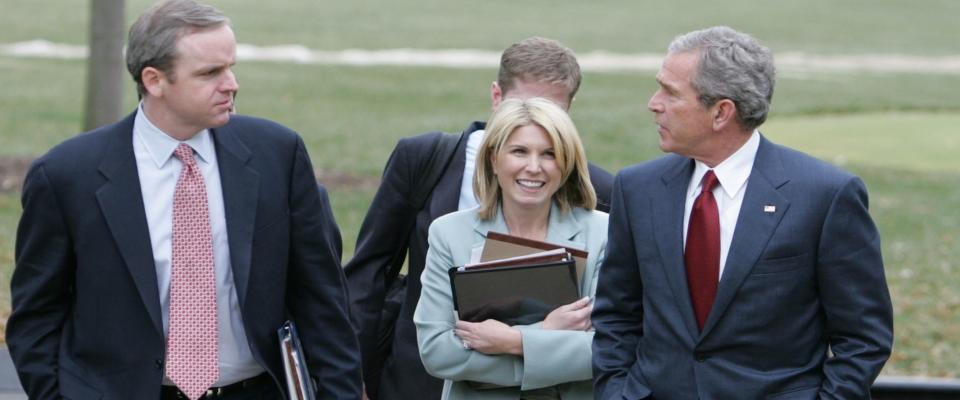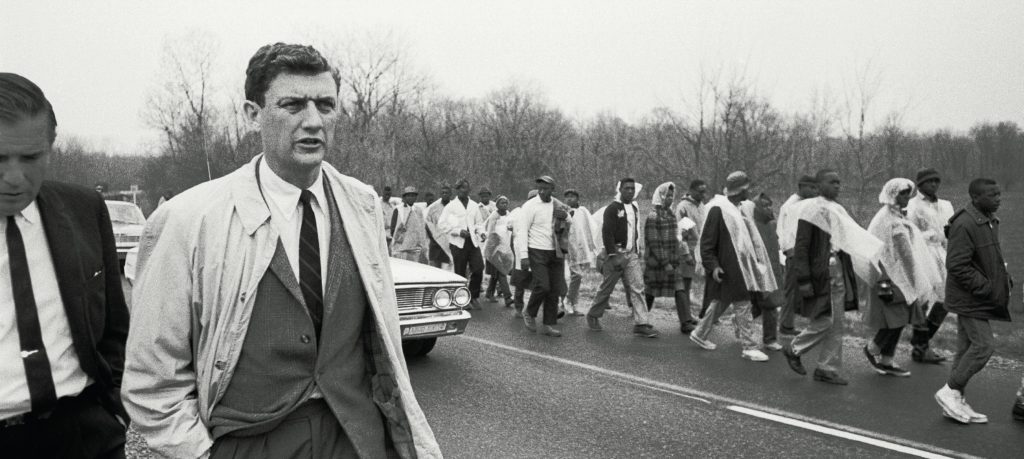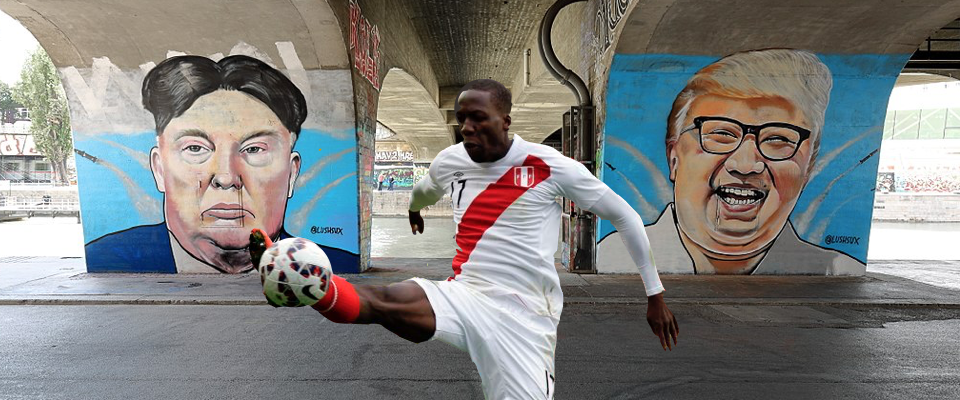The post-political career of a White House spin doctor
Nicolle Wallace, President George W. Bush’s communications director and a top campaign advisor to Senator John McCain, doesn’t fit the public perception of a Republican operative. The stunning 37-year-old with a girl-next-door face framed by parentheses of blond hair is a graceful feminist with empathy for those on the other side. In a political landscape splashed in red and blue, Wallace scans for purple.
The 1994 Berkeley grad, now a novelist and TV pundit, is as likely to have a drink with conservative Sean Hannity of Fox News as with MSNBC’s liberal Rachel Maddow. Wallace’s critics, too, are bipartisan, including right-wingers who blame her for all that went wrong with Sarah Palin’s run for vice president.
Although Wallace never took notes while in the White House or on the campaign trail, she stored insights. Such as “Blue states have all the culture, but red states, at night, have the Milky Way.” And “Presidents have dogs to make them feel normal.” She wove such tidbits into Eighteen Acres, a novel published last year about a Hillary Clinton–type U.S. president with a Palin-esque VP who clicks around on orange heels and wears clothes too short, low, and tight. The sequel, It’s Classified, will be published this month.
Wallace makes light of her political accomplishments, attributing them to a combination of hard work and good fortune. “I’ve been like Forrest Gump,” she said. “I was at the right place at the right time.”
Her outlook seems unchanged from her White House years. She has only praise for the former president, calling W a man “of tremendous character and grace.” One could almost forget Mission Accomplished or Katrina. “I worked there after 9/11, such an extraordinary time,” she said. Although she acknowledges, “We certainly screwed things up at times,” Wallace said their intent always was to do right for the country. President Bush “infused in everybody a sense of temporary stewardship,” she said.
The oldest of four children, Nicolle Devenish grew up in bucolic Orinda, with a father who thinks he’s “a right-wing nut” but whom she calls “a confused Libertarian”; a mother who’s either a Republican or an independent, depending on whether you ask her or Nicolle; and three more liberal sibs. That the four children graduated from Cal is her parents’ “proudest family statistic,” she says. Although close to her sisters and brother, Wallace is sure they’ve never voted for anyone for whom she has worked.
At Cal, where she obtained a degree in mass communication, she was apolitical. She received a master’s in journalism from Northwestern in 1996, followed by lost years working as what she calls “a mediocre TV reporter.”
By then, she’d learned enough “to think I could help if I went ‘inside.'” She worked with the California State Assembly Republican Caucus when Pete Wilson was governor but was reportedly fired for befriending reporters. Wilson’s former press secretary, Dan Schnur, who is hawkish on Wallace (then still Nicolle Devenish), called her firing “one of the least intelligent personnel decisions in California political history.”
She quickly rose from the sub-basement to the rooftop garden when at 25 she became press secretary to Florida Governor Jeb Bush, taking “a front row seat on the front lines.” She taught herself the basics, such as, “Take 15 minutes to learn what the Everglades are, before you return a call about the Everglades.”
When the Bush v. Gore election devolved into guerilla warfare, Wallace was sent to Palm Beach for what she assumed would be a day or two. Twenty-seven days later, both she and the nation were transformed. While on the job she met Republican attorney Mark Wallace, who would become her husband, and she was eventually coaxed to the White House by President Bush’s staff. Charged with feeding state and local journalists, Wallace encouraged openness.
“Even if most reporters are Democrats, their relationship with the press secretaries have nothing to do with politics and everything to do with information and access,” explained former San Francisco Chronicle bureau chief Marc Sandalow, now associate academic director at UC’s Washington Center. Wallace, he said, “was very good at that.”
“An adversarial relationship with the press is to be avoided at all costs,” cautions Ken Mehlman, former chair of the Republican National Committee and a Wallace friend and mentor. Wallace, he said, “believed that more than anyone did.”
That she was not part of Bush’s inner circle worked to her advantage, she recalls, though her background did give the president pause. In 2003, while traveling on Air Force One, she told Bush she graduated from Cal and “his eyebrow went up.” When she added she’d gone to journalism school, “the other eyebrow went up. He kind of looked at me like, ‘How did you get on my plane?'”
In 2004, Wallace was named communications director for Bush’s re-election campaign when neither he nor his policies were popular. She crafted messages emphasizing Bush’s character and strength, contrasting him with Senator John Kerry’s more nuanced — read flip-flop — approach.
As one of Bush’s top advisors at the White House, Wallace was unafraid to spar with her friend Karl Rove. “Karl is a strong personality, but so is Nicolle,” said Cathie Martin, Wallace’s deputy. “At times they were very, very close, and at times,” she said, “it was very, very harsh.” One such incident occurred in 2005 when Congressman John Murtha, a Democrat and decorated Vietnam vet, called for American troop withdrawal from Iraq in six months. Believing it was “a mistake to treat war critics with hostility,” Wallace recommended inviting Murtha to a weekly White House breakfast. In front of other top advisors, Rove screamed his disapproval. But Wallace, according to Martin, butted heads “with grace.”
Wallace remains self-effacing. “I’m sure I made a hundred mistakes before lunchtime each day, but that’s because I was in a position in which I made 500 decisions before lunchtime,” she recalled. “Mission Accomplished,” she conceded, was one of them.
When Katrina struck, Wallace was in Greece getting married. On the night of her rehearsal dinner, she saw the president say, “You’re doing a heck of a job, Brownie.” As the nation watched the calamity unfold, “the White House was acutely aware of how bad it looked,” Wallace said. “They were trying to do it right. Problem was, they couldn’t get ahead of it.” In an interview, she said no staffer could have made it better — “certainly not me.” Later, she showed signs of regret, emailing, “I had no way of knowing that the worst hurricane in a generation was heading our way.”
The farther away from Wallace one is, the easier it becomes for people on the left — and right — to dislike her. Bloggers have dubbed her a “propaganda spewer,” “primo spinner,” and “Palin saboteur.”
“She was an apologist for Bush Jr., who started two wars with no plans to win nor how to pay for them and then gave huge tax cuts to the top 2 percent of America’s wealthiest people, thus driving America into the worst recession since the Great Depression, leading to a loss of $11 trillion in assets for Americans,” wrote Democratic campaign strategist Bob Mulholland, who, by email, admits he has never met Wallace.
Among those who do know Wallace is Lanny Davis, special counsel and communications strategist for the Clinton White House, who says he has “a high regard for [her] as a fellow professional.” While she expresses her “point of view as a conservative,” he said, she “carries it off with balance, style, and an authenticity.”
“She’s a very rare talent in politics,” said Mark McKinnon, a Democrat who became a top advisor to President George W. Bush. “She’s a warrior in a very bitter caustic, tough environment.” Yet, he said, “she also has what’s rare: a lot of humanity.”
Ken Mehlman, President Bush’s campaign manager in 2004, credits Wallace with introducing the disciplined message and reinforcing it. Wallace says it came from the top: “President Bush believed in and lived by the most effective message discipline I’d ever seen, until President Obama came along and did the exact same thing in 2008,” she said. “It’s extremely helpful in a campaign, and the side that communicates with greater clarity usually prevails.”
As White House communications director, Wallace managed Bush’s every public comment and appearance. Many days she was in meetings from 8 a.m. to 6 p.m., and then had to grapple with 88 new voicemails. She often felt as though she was but one Google search ahead of reporters.
Eventually the pressure of serving the President took its toll. She couldn’t plow through her voluminous voicemail and email or complete a meal without interruption. She regretted missing out on the rest of life, including, she said, “time with my family.” She had reservations about remaining at the White House, and in 2006, after her husband had moved to New York to become United Nations ambassador, her orange light blinked red. She left the White House and moved to New York, where she became a CBS contributor and advisor to Katie Couric.
But when John McCain asked her to become senior advisor to his 2008 campaign and her husband to become deputy campaign manager, both signed on. Although not consulted during the selection process, Wallace was responsible for prepping Palin to meet the world beyond Alaska. The collision between the McCain and Palin camps, Wallace said, turned into “a violent, fiery wreck.” She couldn’t rein in Palin, who said what she thought even when it differed from the McCain position.
After the infamous interview in which Palin stumbled over Katie Couric’s questions about what newspapers she read and which Supreme Court decisions she opposed, Palin would hold Wallace responsible for that and other mishaps. Traumatized by the accusation that she was disloyal, Wallace said, “If someone wants to throw me under the bus, my personal belief is that the most graceful thing to do is to lie there.” She would later call herself “the road kill of 2008 campaign.”
It was hardly a happy ending to her political career, but “taking something that’s really painful and turning it into something you can laugh about, that’s Nicolle,” said Mercy Schlapp, who worked with Wallace in the Bush White House. And in Eighteen Acres, the Palin-like character who goes defiantly off script is described as “loud, tacky, and rude.” Wallace insists hers is a work of fiction. Ahh, right.
Recently on MSNBC, Wallace let down her guard about Palin: “I really believe that if it looked like she were about to become the nominee, or heaven forbid the leader of the free world, a whole lot of people would stand up and say a whole lot of things.” Despite working so hard for McCain-Palin, she says she abstained from voting in that election.
Wallace and her husband now live in New York City and Connecticut, where they have no “status wall” of photos with world leaders in chummy poses. They don’t even talk about their White House years much anymore.
Her days are filled with walks with her vizsla Lilly in Central Park, exercise, and writing like a college kid on deadline. Politics, the novelist says with pleasure, “is in the rearview mirror.”






















